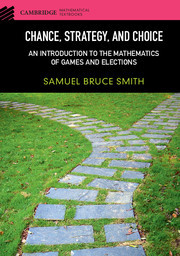Description
Chance, Strategy, and Choice
An Introduction to the Mathematics of Games and Elections
Cambridge Mathematical Textbooks Series
Author: Smith Samuel Bruce
This classroom-tested undergraduate textbook is primarily intended for a general education course in game theory at the freshman or sophomore level.
Language: English
Subject for Chance, Strategy, and Choice:
Approximative price 42.67 €
In Print (Delivery period: 14 days).
Add to cart
Publication date: 06-2015
352 p. · 18.4x26.1 cm · Hardback
352 p. · 18.4x26.1 cm · Hardback
Description
/li>Contents
/li>Biography
/li>
Games and elections are fundamental activities in society with applications in economics, political science, and sociology. These topics offer familiar, current, and lively subjects for a course in mathematics. This classroom-tested textbook, primarily intended for a general education course in game theory at the freshman or sophomore level, provides an elementary treatment of games and elections. Starting with basics such as gambling, zero-sum and combinatorial games, Nash equilibria, social dilemmas, and fairness and impossibility theorems for elections, the text then goes further into the theory with accessible proofs of advanced topics such as the Sprague?Grundy theorem and Arrow's impossibility theorem. ? Uses an integrative approach to probability, game, and social choice theory ? Provides a gentle introduction to the logic of mathematical proof, thus equipping readers with the necessary tools for further mathematical studies ? Contains numerous exercises and examples of varying levels of difficulty ? Requires only a high school mathematical background.
1. Introduction; 2. Games and elections; 3. Chance; 4. Strategy; 5. Choice; 6. Strategy and choice; 7. Choice and chance; 8. Chance and strategy; 9. Nash equilibria; 10. Proofs and counterexamples; 11. Laws of probability; 12. Fairness in elections; 13. Weighted voting; 14. Gambling games; 15. Zero-sum games; 16. Partial conflict games; 17. Take-away games; 18. Fairness and impossibility; 19. Paradoxes and puzzles in probability; 20. Combinatorial games; 21. Borda versus Condorcet; 22. The Sprague–Grundy theorem; 23. Arrow's impossibility theorem.
Samuel Bruce Smith is Professor and Chair of Mathematics at Saint Joseph's University and a past Director of the University Honors Program. In 2012, he won the Tengelmann Award for Distinguished Teaching and Research.
© 2024 LAVOISIER S.A.S.



